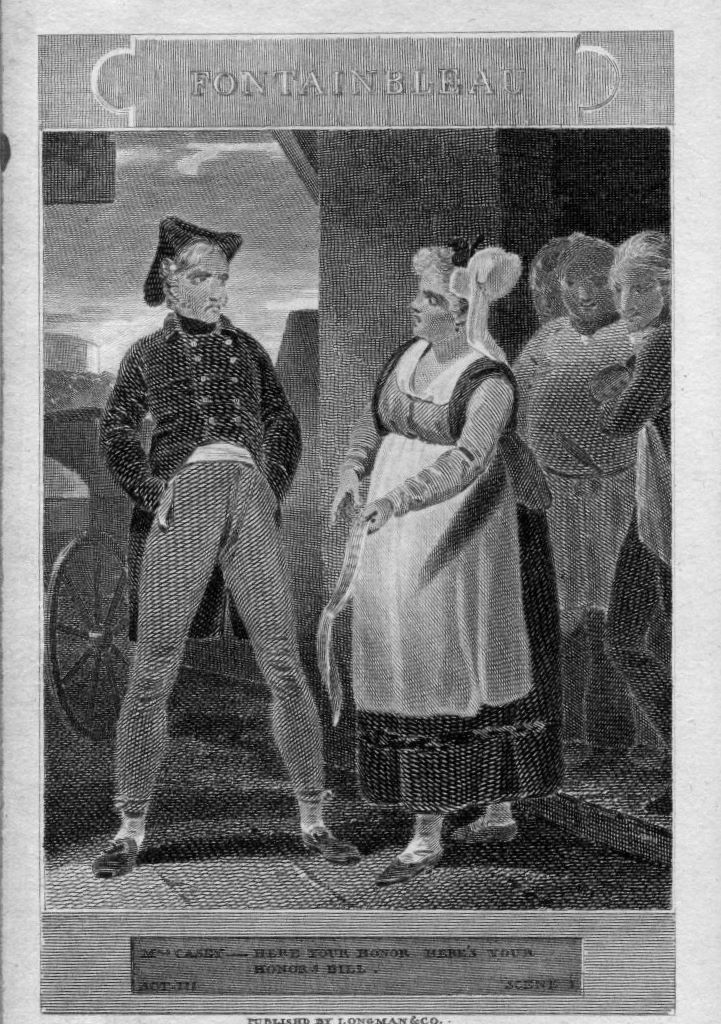FONTAINBLEAU
 MRS CASEY—HERE YOUR HONOR HERE'S YOURHONOR'S BILL.
MRS CASEY—HERE YOUR HONOR HERE'S YOURHONOR'S BILL.ACT III SCENE I
PUBLISHD BY LONGMAN & CO.
FONTAINBLEAU;
A COMIC OPERA.
IN THREE ACTS;
By JOHN O'KEEFFE, Esq.
AS PERFORMED AT THE
THEATRE ROYAL COVENT, GARDEN.
PRINTED UNDER THE AUTHORITY OF THE MANAGERS
FROM THE PROMPT BOOK.
WITH REMARKS
BY MRS. INCHBALD.
LONDON:
PRINTED FOR LONGMAN, HURST, REES, AND ORME,
PATERNOSTER ROW.
WILLIAM SAVAGE, PRINTER,
LONDON.
REMARKS.
The title of this play gives a sensation of both painand pleasure.—Fontainbleau was a favourite residenceof a number of the French kings, and the spot wherethe princes of the blood resorted, with all the nobilityof the land, when the sports of the field, or the course,were the particular objects of their pastime. Pastimeis a word no longer used in the vocabulary of thecourt of France—Every moment has now its impendingcares, and teems with the fate of empires!
At the time this opera was written, (in 1784) the lateDuke of Orleans frequently visited England, and wasremarkable for his passionate attachment to Britishmodes and manners. The character of Colonel Epaulette,in this drama, was supposed to be founded onthis, his highness's extravagant partiality. There isthat trait, indeed, of the duke's propensity, in Epaulette;but in all other respects, the colonel neithersoars, nor grovels, with his royal archetype, in anyone action of notoriety.
The author would not take the liberty to characterisea foreigner, without dealing, at the same time,equally free with one of his own countrymen. Thepart of Lackland was taken more exactly from life,than that of Epaulette, from a gentleman well knownabroad by every English traveller; and whose realname is so very like the fictitious one here adopted,that a single letter removed, would make the spellingjust the same.
The reader will observe in this Lackland, so muchof debased nature, and of whimsical art; so muchof what he has probably met with upon journeys, oramongst common intruders at home, that he will regret,that the author, in his delineation, swerves nowand then from that standard of truth, to which he,possibly, at first meant to adhere; and for the sake ofdramatic effect, has made this hero, in effrontery, proceedsomewhat too far beyond its usual limits.
The family of the Bulls, especially Miss Bull andher father, are likewise portraits rather too bold; butthey are humorous pictures, and, no doubt, perfectcopies of such citizens, as inhabited London a fewcenturies past.
Squire Tallyho gives, like them, some idea of formertimes; for his manners do not exactly correspondwith those of the modern gentlemen of the turf.
Lapoche is, perhaps, an exact Frenchman of thetime in which he was drawn; and, as such, the mostagreeable object for an Englishman's ridicule. Themistakes which occur, to both Mr. and Mrs. Bull,in respect to this insignificant, and that pompous man,Epaulette, are incidents of very rich humour, thoughthey place the opera more in that class of the drama,which is called farce, than in that of comedy. Suchis the incident,